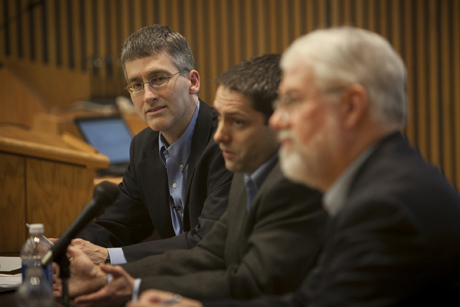New economics research helps developing world
By Linda B. Glaser

Cornell’s newly merged Department of Economics is thriving, professors told a packed Hollis E. Cornell Auditorium June 8 at Reunion 2013 as they offered an inside look at the department and their fields of study and research.
The new department serves 750 undergraduate majors and more than 100 Ph.D. students and teaches more than 5,500 students a year, economics professor George Boyer said. “The department has begun a massive faculty recruiting effort that is expected to last for several years,” said Boyer, who noted three new professors will arrive on campus this coming academic year.
In addition, the department recently announced a new, improved economics major, and plans call for a new undergraduate lounge and study space and the hiring of a student experience coordinator.
Boyer introduced economics professor Ted O’Donoghue as “one of the leaders of the generation of behavioral economists who helped bring the research into mainstream economics.” O’Donoghue will serve as associate chair for the economics department beginning July 1.
Behavioral economics uses insights from psychology to understand and improve economic outcomes, O’Donoghue explained. “Cornell has perhaps the best connection anywhere of economists and psychologists” who actively collaborate, he said.
O’Donoghue discussed his research on “present bias” – people emphasizing the “now” – and highlighted how this bias can have big implications due to incremental bad decisions. For example, present bias can cause people to repeatedly put off going to the gym until “tomorrow” and ultimately cancel their membership but only after months of paying for something they’re not using.
Currently, O’Donoghue is examining whether households in Tanzania take advantage of small bulk discounts, such as whether to purchase food for that day’s use or to purchase for the week. “We are finding that many households don’t take advantage of these bulk discounts, and as a result they’re spending 20 to 40 percent more than they need to for these goods,” he said. “For some of these households, if they just rearranged their purchasing, they might move from below the poverty line to above the poverty line.”
James Berry, assistant professor of economics, said his research in the field of development economics seeks to generate solutions to poverty through economic analysis. “Our big-picture goal is to design policies that improve economic outcomes, but much of what we do is first try to understand the economic outcomes that we observe in the world,” he said.
Berry is conducting several field experiments, one of which examines why so many children drop out after primary school in developing countries. “Do parents undervalue education? Do they lack access? How do education systems contribute to poor outcomes?” he asked, pointing out that he’s applied the same types of questions to health decisions in developing countries.
He’s also looking at an adult literacy program in India to see whether educating parents affects children’s educational attainment. Berry randomly assigned villages to either receive mother literacy classes or no classes. His results showed that increasing women’s literacy empowered women, increased child learning and improved the home learning environment. “But it was a huge challenge to get the mothers to attend these classes,” he said.
The new Cornell Department of Economics was created in July 2011 to bring together strengths in economics from across the university’s colleges and schools into one academic unit. The department includes all economics faculty from the College of Arts and Sciences, all labor economists from the ILR School and a number of senior professors from the Samuel Curtis Johnson Graduate School of Management, the Charles H. Dyson School of Applied Economics and Management and the College of Human Ecology’s Department of Policy Analysis and Management with joint appointments.
Linda B. Glaser is staff writer for the College of Arts and Sciences.
Media Contact
Get Cornell news delivered right to your inbox.
Subscribe